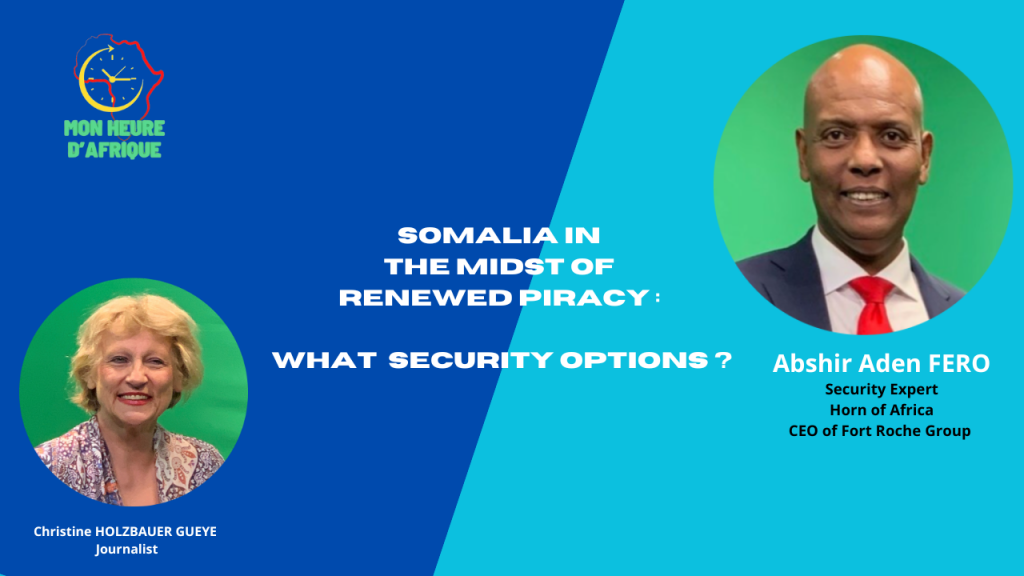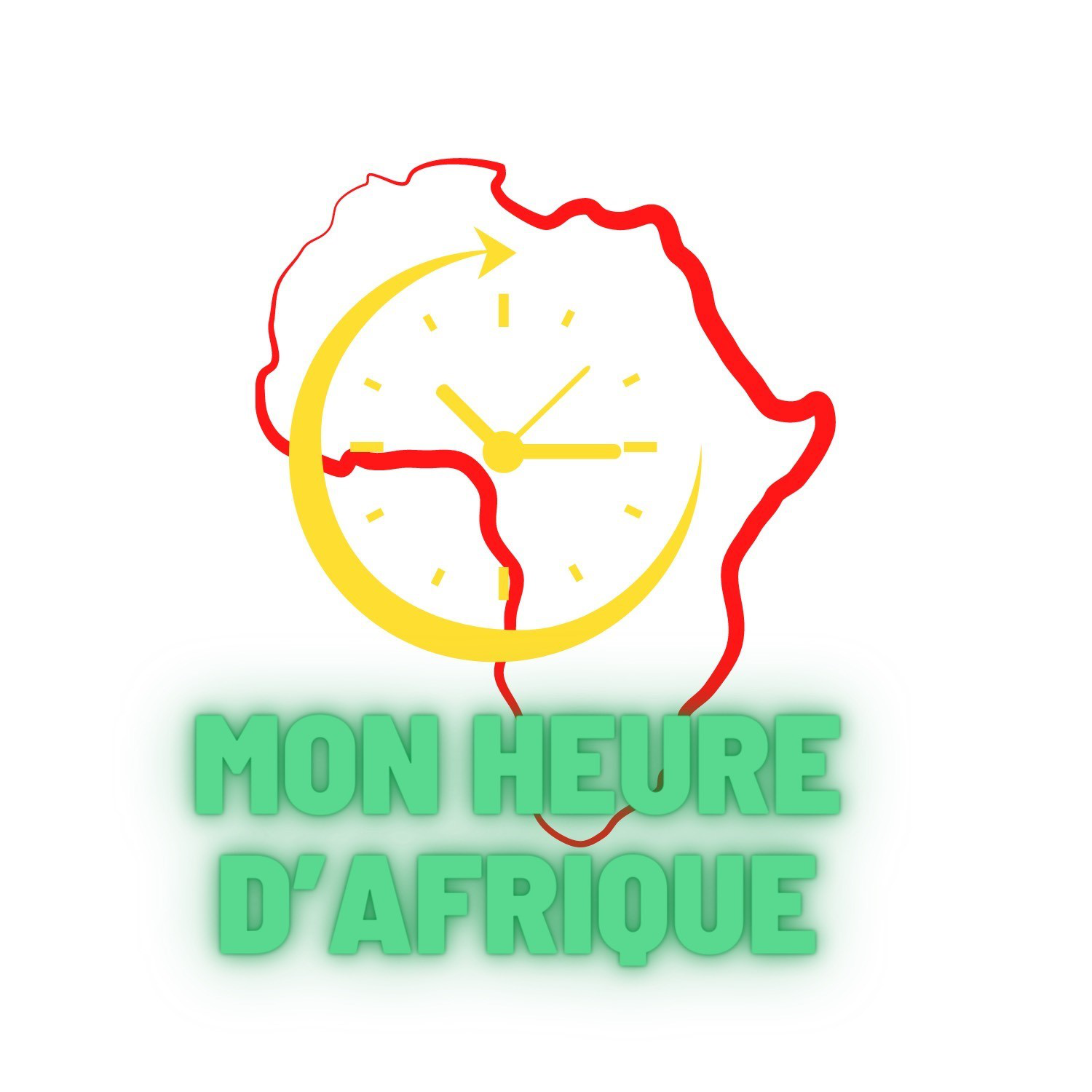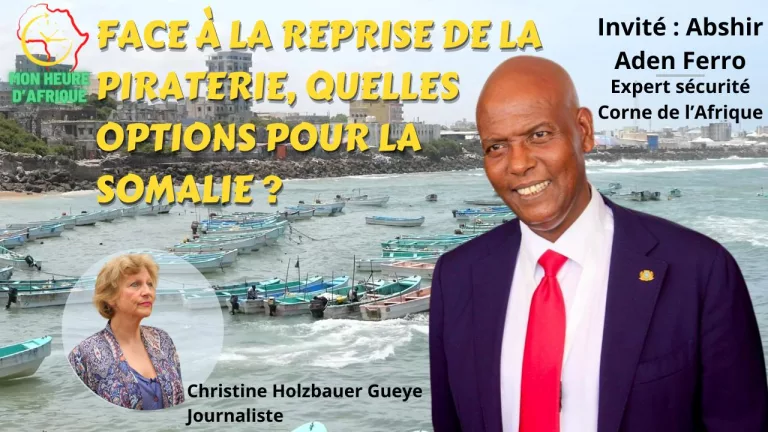
The guest of the seventh edition of “My African Hour” is the Franco-Somali businessman and candidate for the 2026 presidential elections in Somalia, Mr. Abshir Aden Ferro. In this issue devoted to security in the Red Sea and the Gulf of Aden, the CEO of the London based Fort Roche group, which deals with securing sites, discusses the consequences for Somalia of renewed violences in the Horn of Africa due to attacks by the Houthis from Yemen, supported by Iran.
The association Mon Heure d’Afrique, that produces the eponymous TV show (MHA), has asked for three reports realized on the ground in Somalia, Djibouti and Ethiopia for its guest to comment live. Already battered by thirty years of civil war, Somalia is experiencing a new upsurge in piracy, after the relative lull of the last ten years. Being located in the midst of Red Sea, Djibouti occupies a strategic place in the region, with fleets from around the world patrolling at its shores. This neighbor of Somalia has managed to do well until now, even taking advantage of the interruption of maritime trade due to Houthi attacks thank to its port. Ethiopia, which has 123 million inhabitants, is with no access to the sea after losing its war against Eritrea in 1991. To escape the extra costs imposed by Djibouti for the use of its port facilities, Addis Abeba has signed, on January 1, 2024 a Memorandum of Understanding (MoU) with Somaliland regarding the port of Berbera. Somalia protested the deal since Somaliland is a self-proclaimed state without international recognition.
Mr. Ferro is being challenged as well by two eminent experts: the first one is the former special representative of the Secretary General of the United Nations (RSSG) in Somalia from 2007 to 2010, Mr. Ahmedou Ould Abdallah. His first question is about how Mr. Ferro intends to resolve the problem of the conflict with the armed group Al Shabab if he wins the presidential elections in 2026. Since 2007, this terrorist group has fought the Somali government and the African Union Transitional Mission in Somalia (ATMIS), a multidimensional peace keeping mission authorized by the African Union and mandated by the United Nations Security Council. Mr. Ould Abdallah also asks the question about the African Union sending troops to Somalia and how Mr. Ferro sees this AU mandate in Somalia evolving if he is elected.
The expert on the geopolitics of Iran, Mr. David Rigoulet-Roze, is the second one to challenge him. He is a researcher attached to the French Institute of Strategic Analysis (IFAS), an associated researcher at the Institute of International and Strategic Relations (IRIS) and editor-in-chief of the magazine Strategic Orients. He questions Mr. Ferro on two counts: on the one hand, how the latter would like to see the mission of EUNAVFOR evolving. EUNAFVOR ATALANTA has been fighting against piracy in Somalia since 2008 within the framework of the European ATALANTA operation. And, on the other hand, how Mr. Ferro sees his country, Somalia, which is located on a strategic global navigation route in the Red Sea and the Gulf of Aden, facing the rivalries of great powers like the United States and the China, but also emerging powers like Turkey, the United Arab Emirates (UAE) and, of course, Iran.
Conceived and produced by Christine Holzbauer Gueye, this TV program has defended – since its launch in 2021 – an independent African point of view through news reports produced in Africa by partner African televisions. A specialist in West and Central Africa, this seasoned reporter traveled the continent as a correspondent for major French newspapers based first in Bamako (Mali) and, then, in Dakar (Senegal), where she lived for more than fifteen years before returning to France in 2016. In parallel with the TV show that she produces, directs and presents, she created an association intended to promote freedom of expression in Africa and in the African diasporas by improving audiovisual content that is impartial and verified.
The association Mon Heure d’Afrique supports African crew (JRI – Journalists Reporters of Images), as well as African TV channels it solicits for the production of the news reports that are being broadcast in its program. It also can contribute expertise or participate in seminars in order to help the editorial staff of national or local African channels to fight against fake news. And help African television stations, that do not yet have one, to create a “True or False” section to be broadcast permanently on their channels.

